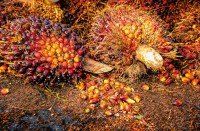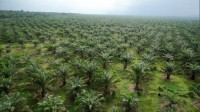Forum Nachhaltiges Palmöl - FONAP
Palm oil – blessing or curse?
There‘s no getting around the topic of palm oil right now within food products industry circles. Manufacturers are reacting sensitively to inquiries about the oil‘s use and promoting new recipes along with the claim “Without palm oil”. And in cases where palm oil is still
used manufacturers are giving assurances that it comes from sustainable production sources.
By Dr Jörg Häseler
The trend toward rejecting palm oil is based on a decision by the European Food Safety Authority announced in May of 2016. The decision notes that incorrect processing of the oil can produce carcinogenic substances and further asserts that children exposed to heavy palm oil consumption are particularly endangered. A total of 7,175 analysis data from 23 European countries were registered between 2009 and 2015 on the presence of these substances in food products.
The relevant compounds glycidyl-fatty acid esters and 3-MCPDs were found in cooking oils and fats and in food products made using them, including baked and confectionery products, chocolate toppings, peanut butter and various snack products such as potato chips. The highest concentrations of these substances are found in palm oils and fats, but they are also found in other plant-based oils and fats such as coconut oil/fat, walnut, sunflower, soybean and rapeseed oil as well as in margarine. The benefits of palm oil for the food products industry are obvious. Prof. Simone Peschke from the Beuth University of Applied Sciences Berlin elaborates saying, “Palm oil has unique properties. It is heat-resistant and oxidation-stabile, so it doesn‘t go bad quickly. Raw palm oil is rich in Vitamin E and carotinoids. And palm oil contains no trans-fatty acids”.
“Palm oil is the most all-purpose oil”
Along with coconut fat, palm fat is the only plant-based fat that remains solid at room temperature. It is spreadable and taste-neutral, a factor that is especially valuable for the food industry. These positive arguments are also confirmed by Germany‘s “Südwind e. V. – Institut für Ökonomie und Ökumene” consumer watchdog agency which states, “Palm oil is the most all-purpose oil of all the available comparable oils. Against the backdrop of the growing world population, changing patterns of consumption and the growing need for agricultural raw materials, palm oil obtained from limited cultivation areas is virtually indispensable”.
There is however controversy surrounding the fact that the heavy demand for palm oil has resulted in intensive clearance of Southeast Asia‘s rainforests. In this regard Südwind e.V. additionally notes, “On the other hand, the potential palm oil cultivation spaces are located in highly sensitive ecological areas, and the most common monocultural means of cultivation conceals a wealth of risks and goes hand-in-hand with major rainforest losses. The immense ecological problems are further complicated by social injustices including illegal land grabs or the precarious social situation that many people employed in palm oil cultivation find themselves in”. As such, an intermediate summary of the situation establishes that the demand for an alternative to palm oil must also consider that this simultaneously requires more land for cultivation. This illustrates the dilemma that a switch to alternatives like rapeseed, sunflower or coconut oil fails to resolve the challenge – neither in ecological nor in economic terms.
In an effort to gain control over the problem the World Wide Fund for Nature (WWF) has proposed the following solution: Palm oil consumption must be reduced drastically. To ensure that palm oil is produced sustainably only certified imports should be permitted in the future. This aim is pursued by the initiative called the “Forum for Sustainable Palm Oil”. The forum‘s goal is “to significantly increase the proportion of segregated, certified palm oil and palm ker-nel oil or corresponding derivatives thereof on the German, Austrian and Swiss markets and to make 100 % segregated, certified palm oil and palm kernel oil available for these markets as quickly as possible”.
FONAP members receive advice and support
The forum consists of a collection of private companies, NGOs and associations in conjunction with Germany’s Federal Ministry for Food and Agriculture (BMEL). FONAP is the product of an initiative started by the private companies Henkel, Rewe and Unilever together with the NGO WWF. The initiative was founded in September of 2013. The forum was officially registered as an organisation in November of 2015 and is funded by the BMEL‘s “Fachagentur für Nachwachsende Rohstoffe”, the central coordinating institution for research, development and demonstration projects in the field of renewable resources. More than 40 members are actively involved, including smaller, mid-sized and large multinational companies from a variety of different palm oil processing sectors.
The forum‘s activities are coordinated and directed by its General Assembly and Board of Directors. The board is comprised of representatives from the companies Kuchenmeister, Rewe, Unilever, and Weleda along with WWF and BMEL. The members decide on all of the activities undertaken by the forum. Workgroups comprised of honorary representatives from the member companies support this work and advise the board.
The workgroups are appointed by the Board of Directors based on the recommendation of its members. The “Deutsche Gesellschaft für Internationale Zusammenarbeit GmbH” (GIZ) is responsible for the coordination of the forum‘s secretariat. The secretariat supports the Board of Directors and members in the implementation of agreed resolutions and provides advisory services related to every aspect of the issue.
The initiative also promotes the development and improvement of existing certification systems and interconnectivity with other sustainability initiatives and interested companies in Europe. The FONAP members receive advice and support in relation to procuring sustainable palm oil. The forum‘s Chairperson Merlin Koene explains, “We create market transparency with up-to-date data and statistics. In the future we want to use concrete projects to also support small private farmers in developing countries and integrate them into the international added-value chain”.•
Members of FONAP
Bahlsen, Bundesvereinigung der Deutschen Ernährungsindustrie, Care Naturkost, Continental Bakeries Deutschland, Daabon Europa, Dan Cake, DNV GL Business Assurance Zertifizierung & Umweltgutachter, Ferrero Deutschland, Griesson – de Beukelaer, Kaufland Warenhandel, Kneipp, Lorenz Bahlsen Snack-World Germany, NOW Nordische Oelwerke Walther Carroux, OVID Verband der ölsaatenverarbeitenden Industrie in Deutschland e. V.




